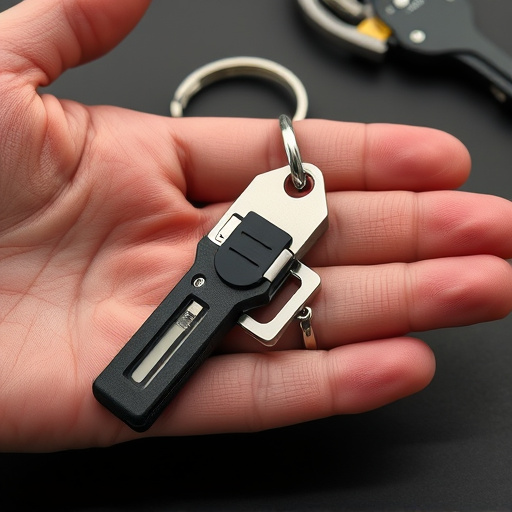Self-defense keychains' legal status and effectiveness hinge on understanding local laws and material durability. Military-grade keychains, made from robust alloys or advanced composites, offer superior strength and resistance, ensuring they withstand intense use. State regulations vary widely, impacting keychain features like material composition and force capabilities. Staying informed ensures compliance and the keychain's ongoing reliability as a personal safety tool.
In today’s world, personal safety is paramount. One innovative solution gaining traction is the self-defense keychain—a compact, yet powerful tool designed for emergency situations. This article delves into the legal framework surrounding these keychains, focusing on military-grade material standards and durability tests. We explore state-specific regulations and compliance requirements, ensuring you understand the vital aspects of choosing a reliable, durable self-defense keychain while adhering to legal constraints.
- Legal Framework for Self-Defense Keychains
- Military-Grade Material Standards
- Durability Tests and Requirements
- State-Specific Regulations & Compliance
Legal Framework for Self-Defense Keychains
In many jurisdictions, the legal framework surrounding self-defense keychains is evolving and often requires careful navigation. These laws vary significantly from state to state, with some places explicitly allowing self-defense tools as personal protection devices while others have stringent regulations. When considering a military-grade keychain designed for durability and functionality, it’s crucial to understand one’s rights and the specific legal requirements.
Self-defense keychains, often crafted from robust materials, must meet certain standards of quality and design. The legality of such tools is based on principles of reasonable force in self-defense, ensuring that citizens can protect themselves without causing excessive harm. States may have specific guidelines on the type of material, size, or shape allowed, with an emphasis on durability to guarantee their effectiveness in real-life scenarios.
Military-Grade Material Standards
When considering a self-defense keychain, one crucial aspect to evaluate is its construction material and durability, especially if you’re looking for something described as military-grade. These keychains are designed to withstand rigorous use and extreme conditions, ensuring they remain reliable when needed most. The materials used play a significant role in achieving this level of performance.
Military-grade keychain material standards typically involve robust alloys, high-quality stainless steel, or even advanced composite materials. These materials offer superior strength, corrosion resistance, and longevity. The durability of these keychains allows them to retain their integrity during intense impact or stress, making them a preferred choice for personal safety accessories.
Durability Tests and Requirements
When assessing a self-defense keychain’s legal status, one crucial factor is its durability. These keychains often face rigorous tests to ensure they can withstand everyday wear and potential impact scenarios. The material used should be military-grade, meeting strict standards for strength and reliability. This is particularly important as it determines the keychain’s ability to remain functional during critical situations.
Durability requirements vary across states but generally involve drop tests, flexing, and environmental exposure simulations. The keychain must demonstrate exceptional resilience without compromising its design integrity. High-quality materials like robust alloys or advanced polymers are favored for their superior resistance to corrosion, impact, and everyday abuse, making them suitable choices for self-defense tools.
State-Specific Regulations & Compliance
When considering self-defense keychains, understanding state-specific regulations is paramount for compliance and personal safety. Each US state has its own set of laws governing the possession and use of personal defense tools, including keychains designed for self-protection. These regulations vary widely, affecting everything from legal definitions of “deadly force” to restrictions on specific weapon types or features.
For instance, some states allow only certain types of self-defense keychains, focusing on durability and military-grade materials as key indicators of safety and reliability. States may also mandate minimum requirements for active ingredients in pepper spray keychains, set limitations on carry permissions, or even require registration or permits for specific defensive tools. Staying informed about these regulations is crucial to ensuring your keychain remains a lawful and effective personal defense tool.
In conclusion, the legal framework governing self-defense keychains involves a complex interplay of federal and state regulations, with a strong emphasis on military-grade material standards and durability. Ensuring your keychain meets these requirements is crucial for both personal safety and legal compliance. By understanding the specific rules in your state, you can choose a durable, high-quality keychain that offers reliable self-defense capabilities without legal repercussions.
